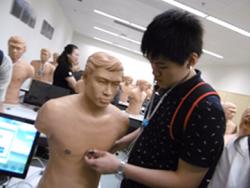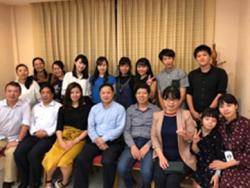International and Domestic exchange
Kazuki Kishi (2nd year student)
After completing my study abroad at Shantou University in China
This time I participated in the study abroad program at Shantou University in China for 8 days and 7 nights. It was my first time to study abroad and I learned a lot.
On the first day, we gathered at Kansai International Airport and drove about 3 hours to Guangzhou International Airport. The view from the window just before we landed was lined with skyscrapers and towers, and I realized that this is a metropolis that rivals Tokyo and Osaka. After connecting flights, it took us one hour to arrive at Shantou. As soon as I arrived, Dr. Cheng welcomed me. We took a bus from the airport to the hotel. Dr. Cheng described Shantou as a countryside city, but after getting off the highway and entering the city center, I saw malls and condominiums lining the main street, which made me realize that this was a countryside city on a different scale from Japan. When I arrived at the hotel, a welcome dinner was held, and various teachers who will take care of me from now on welcomed me enthusiastically. Many of the teachers were fluent in Japanese, which made me feel at ease.
On the second day, we went to observe volunteer activities in a poverty-stricken area. A short one-hour drive on the highway brought us to a rural area with a completely different environment and lack of facilities from the city center. There, every Sunday morning, volunteers were working in the square, where medical personnel and students were providing various medical services to those who could not go to the hospital. Although the students were also second-year students, I thought the clinical practice was very well organized, with the students standing beside the doctor in medical examinations and only the students performing simple tests. In the afternoon, I walked from the plaza to the home-visit medical care. At the home visit, we not only examined the patients, but also provided rice and oil. Seeing patients suffering from illnesses in a dark and cramped room with a strange-smelling irrigation canal and battered walls, I was reminded of how fortunate my life is. I believe that I was able to see the essential part of medicine, which is not the pursuit of profit but to help those who suffer. I also heard from the doctor that in areas of China where Western medicine is not well developed, there are people who do not feel good about doctors, and that doctors are sometimes attacked by their patients and their families because they resent the worsening of symptoms or the death of their patients, and that while in urban areas there are hospitals and doctors with world-class equipment and technology, in rural areas there is still I thought that awareness-raising has not yet progressed.
On the third day, in the morning, we walked from the hotel to Shantou University Medical School and Cancer Center. I thought the facilities in the laboratories and the hospital were very expensive and up-to-date, and there was a large machine for radiotherapy, which was introduced several years earlier than in Japan, so I thought the environment was well prepared. I also visited the Chinese medicine preparation room, where various natural ingredients such as licorice, mandarin orange peels, frogs, and cicada shells were cut and crushed to formulate prescriptions, and I thought that Western and Eastern medicine coexisted. On the other hand, however, there were patients who were put out in the hallways due to lack of beds, and some rooms and wards did not seem very hygienic, which made me feel disconnected. There was also a portrait of Mao Zedong at the nurses' station, which gave us a glimpse of China's political background. In the afternoon, we went to Shantou University in the suburbs and were overwhelmed by the size and facilities. School of Medicine In the building of the University of Shantou, there is a facility called the Human Body Life Science Museum, where many specimens using real human bodies are on display, making it very easy to visualize and learn Laboratory of Anatomy. On the upper floor, there are reproductions of various hospital facilities such as examination rooms and ICUs, so I thought it was a very efficient way to learn about clinical matters. The library was so large that it was easy to get lost.
On the fourth day, we went to visit a hospice in the morning, and I was impressed that at the first hospice, all the family members gathered around the patient and watched the doctor's every move with a mysterious look on their faces. I especially remember the patient's wife pacing around restlessly, sometimes crying profusely, and the patient we went to the second house with, who had just been found to have cancer and was about to have surgery, which was a new discovery for me because I had always thought of hospice as palliative care for the terminally ill. In the afternoon we went to the mall and had tapioca juice and ice cream. After that, we were briefed on hospice activities. The content of the activities was roughly the same as what I had seen on Japanese TV a while ago, but I thought we were behind compared to Shantou, which had started 19 years ago, because they said that home-visit hospice had just started in Japan. I also thought that it should be promoted more in Japan, which is facing a late-stage aging society.
On the fifth day, I went to an ophthalmologist for cataract surgery, which took two hours. The doctor there has been an ophthalmologist there for 15 years and treats about 700 patients every year by himself. Before this hospital was built, there were no hospitals nearby and many patients were left without treatment. In the afternoon, we went to Chaozhou to visit a temple established in the Tang Dynasty and an old customs post. The Gwangje Bridge over the Han River was especially spectacular.
On the sixth day, we first visited a cleft lip and palate treatment center. The Lee Ka Shing Foundation has long been treating cleft lip and palate patients free of charge, sometimes in cooperation with the government. I thought it was wonderful that they have actively volunteered to provide medical care that can cure people who have felt alienated from society because their faces are different from others, and that can greatly improve their quality of life. After that, we went to the Neonatal Medical Center. During the tour, one patient's SpO2 dropped and the doctors and nurses rushed to take care of him, so I could feel the urgency of the situation. For lunch, we ate a dish called "intestine powder" at a local restaurant. It was steamed pork or beef wrapped in a skin made from rice. In the afternoon, we went to the psychiatric ward. We were allowed to enter the ward, which was closed with iron bars, and experienced treatment with electric shock and a computer game for therapeutic purposes. I had never had the opportunity to be surrounded by psychotic patients before, so it was very stimulating.
In the morning of the seventh day, we went to a shopping center to buy souvenirs. After that, we went to visit the gynecology department. The examination rooms of the gynecology department were very open and people kept coming in, and there seemed to be little concept of privacy. In the evening, the doctors gathered together and we all made dumplings (we were taught the authentic Beijing style of wrapping). I regret that I could not express what I wanted to say due to my poor English, even though I had many things to say to the teacher, who only spoke English and Chinese, when he asked me how I felt about studying abroad.
Then, on the 8th day, I returned home.
My great-grandfather was killed in the last World War as a soldier of the Imperial Army in Guangdong Province. I felt peace and friendship between Japan and China because I was able to visit Shantou City in Guangdong Province as a foreign student and all the people welcomed us warmly. This study abroad program gave me a very valuable experience that I could never have in Japan, and I do not know if I will be able to experience it again in my future life. To be honest, there were times when I felt uneasy before applying for the study abroad program, but I am very glad that I had the courage to apply. Last but not least, Mr. Hattori, Mr. Cheng, and all the people involved in my study abroad program took care of me from start to finish and treated me very well. I would like to thank them from the bottom of my heart.

